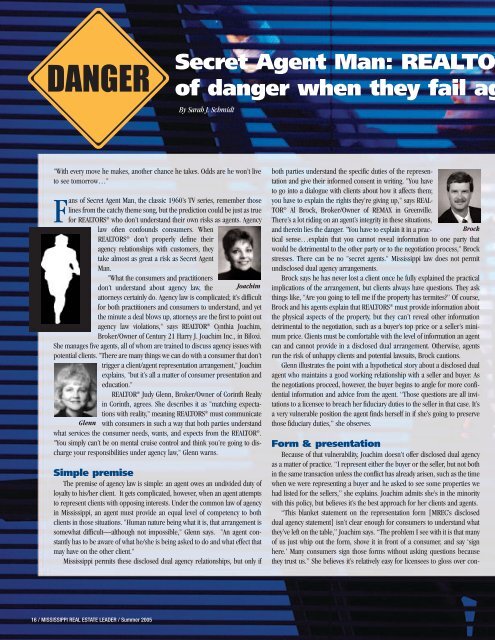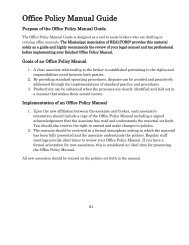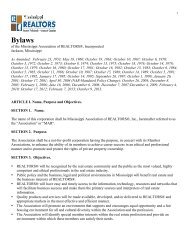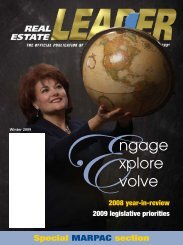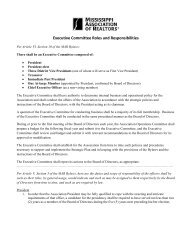Secret Agent Man: REALTO<strong>of</strong> danger when they fail agBy Sarah J. Schmidt"With every move he makes, another chance he takes. Odds are he won’t liveto see tomorrow…"Fans <strong>of</strong> Secret Agent Man, the classic 1960’s TV series, remember thoselines from the catchy theme song, but the prediction could be just as truefor <strong>REALTORS</strong> ® who don’t understand their own risks as agents. Agencylaw <strong>of</strong>ten confounds consumers. When<strong>REALTORS</strong> ® don’t properly define theiragency relationships with customers, theytake almost as great a risk as Secret AgentMan."What the consumers and practitionersdon’t understand about agency law, theJoachimattorneys certainly do. Agency law is complicated; it’s difficultfor both practitioners and consumers to understand, and yetthe minute a deal blows up, attorneys are the first to point outagency law violations," says REALTOR ® Cynthia Joachim,Broker/Owner <strong>of</strong> Century 21 Harry J. Joachim Inc., in Biloxi.She manages five agents, all <strong>of</strong> whom are trained to discuss agency issues withpotential clients. "There are many things we can do with a consumer that don’ttrigger a client/agent representation arrangement," Joachimexplains, "but it’s all a matter <strong>of</strong> consumer presentation andeducation."REALTOR ® Judy Glenn, Broker/Owner <strong>of</strong> Corinth Realtyin Corinth, agrees. She describes it as "matching expectationswith reality," meaning <strong>REALTORS</strong> ® must communicatewith consumers in such a way that both parties understandGlennwhat services the consumer needs, wants, and expects from the REALTOR ® ."You simply can’t be on mental cruise control and think you’re going to dischargeyour responsibilities under agency law," Glenn warns.Simple premiseThe premise <strong>of</strong> agency law is simple: an agent owes an undivided duty <strong>of</strong>loyalty to his/her client. It gets complicated, however, when an agent attemptsto represent clients with opposing interests. Under the common law <strong>of</strong> agencyin <strong>Mississippi</strong>, an agent must provide an equal level <strong>of</strong> competency to bothclients in those situations. "Human nature being what it is, that arrangement issomewhat difficult—although not impossible," Glenn says. "An agent constantlyhas to be aware <strong>of</strong> what he/she is being asked to do and what effect thatmay have on the other client."<strong>Mississippi</strong> permits these disclosed dual agency relationships, but only ifboth parties understand the specific duties <strong>of</strong> the representationand give their informed consent in writing. "You haveto go into a dialogue with clients about how it affects them;you have to explain the rights they’re giving up," says REAL-TOR ® Al Brock, Broker/Owner <strong>of</strong> REMAX in Greenville.There’s a lot riding on an agent’s integrity in these situations,and therein lies the danger. "You have to explain it in a prac-Brocktical sense…explain that you cannot reveal information to one party thatwould be detrimental to the other party or to the negotiation process," Brockstresses. There can be no "secret agents." <strong>Mississippi</strong> law does not permitundisclosed dual agency arrangements.Brock says he has never lost a client once he fully explained the practicalimplications <strong>of</strong> the arrangement, but clients always have questions. They askthings like, "Are you going to tell me if the property has termites?” Of course,Brock and his agents explain that <strong>REALTORS</strong> ® must provide information aboutthe physical aspects <strong>of</strong> the property, but they can’t reveal other informationdetrimental to the negotiation, such as a buyer’s top price or a seller’s minimumprice. Clients must be comfortable with the level <strong>of</strong> information an agentcan and cannot provide in a disclosed dual arrangement. Otherwise, agentsrun the risk <strong>of</strong> unhappy clients and potential lawsuits, Brock cautions.Glenn illustrates the point with a hypothetical story about a disclosed dualagent who maintains a good working relationship with a seller and buyer. Asthe negotiations proceed, however, the buyer begins to angle for more confidentialinformation and advice from the agent. “Those questions are all invitationsto a licensee to breach her fiduciary duties to the seller in that case. It’sa very vulnerable position the agent finds herself in if she’s going to preservethose fiduciary duties,” she observes.Form & presentationBecause <strong>of</strong> that vulnerability, Joachim doesn’t <strong>of</strong>fer disclosed dual agencyas a matter <strong>of</strong> practice. “I represent either the buyer or the seller, but not bothin the same transaction unless the conflict has already arisen, such as the timewhen we were representing a buyer and he asked to see some properties wehad listed for the sellers,” she explains. Joachim admits she’s in the minoritywith this policy, but believes it’s the best approach for her clients and agents.“This blanket statement on the representation form [MREC’s discloseddual agency statement] isn’t clear enough for consumers to understand whatthey’ve left on the table,” Joachim says. “The problem I see with it is that many<strong>of</strong> us just whip out the form, shove it in front <strong>of</strong> a consumer, and say ‘signhere.’ Many consumers sign those forms without asking questions becausethey trust us.” She believes it’s relatively easy for licensees to gloss over con-16 / MISSISSIPPI REAL ESTATE LEADER / <strong>Summer</strong> 2005
RS ® live a lifeent responsibilitiesflict <strong>of</strong> interest issues, leaving consumers with very little clarity about the rightsthey’re giving up in a disclosed dual agency arrangement.REALTOR ® Ellen Short, Broker/Owner <strong>of</strong> TRI G.M.A.C. in Tupelo, thinks theproblem is more systemic: “Quite <strong>of</strong>ten, my agents encounterpotential clients who, when introduced to the agency disclosureform, say they’ve never even seen that form, although they’veworked with other real estate companies.” She believes there arestill many licensees who simply don’t use the form, eitherbecause they forget or don’t fully understand the risks. Her policyis to meet customers first, talk about their needs, and properlyformalize the agency relationship. But there are times whenShortshe’s had to meet a customer on short notice, which left no option but to signthe agency form “on the hood <strong>of</strong> the car,” as she describes it. In her wholecareer, she’s only had two people who didn’t sign, so she asked them to writea statement at the bottom <strong>of</strong> the form saying they’d been presented with theinformation but elected not to sign. In both cases, she was then able to showthe property with all parties knowing exactly who she was or was not representingat the time.Although the “hood <strong>of</strong> the car” approach is bound to happen, Al Brocksays that’s the one situation that creates “a sticking point” in his practice. Incompliance with MREC Rule IV.E.2(h), licensees must present the agency disclosureform entitled, “Working with a Real Estate Broker,” to prospectiveclients at the first substantive meeting. Brock thinks the “hood <strong>of</strong> the car”approach leaves too much room for misinterpretation. “We should, as pr<strong>of</strong>essionals,be able to time that first substantive meeting in a manner and environmentthat’s more appropriate,” he says.Changing timesWhen it comes to agency relationships, timing can make a world <strong>of</strong> differencebetween risk and rewards. It’s the changing times that brought<strong>Mississippi</strong> <strong>REALTORS</strong> ® to this uncertain point with agency relationships in thefirst place, explains Joachim. “The marketplace is constantly changing, and<strong>REALTORS</strong> ® have to adapt,” she says. “The days are gone when our only clientswere people we’d known for years. Now, we’re inundated with buyers whocome from other states with more sophisticated agency laws, and they expectthe level <strong>of</strong> pr<strong>of</strong>essionalism they had elsewhere. When that doesn’t happen,they’re quick to bring complaints or lawsuits.”The camera pans tight on Secret Agent Man as the theme song rises….“With every move he makes, another chance he takes.” These days, REAL-TORS ® must go the extra mile to provide a competitive level <strong>of</strong> pr<strong>of</strong>essionalismand protect themselves in the process. nAgency law: Is it time for change?By Dianna BrouthersFred has been in the real estate business for more than 25 years, specializingin residential resales and new construction. His dedication toclients and the community has established him as one <strong>of</strong> the most successfulcompanies in the area. Firmly grounded in the traditions <strong>of</strong> real estatebrokerage that were passed on to him by his mentors, Fred follows the businessplan that he made as a new broker/owner and has watched many "newand improved ideas" come and go. Fred has always applied the "if it ain’tbroke, don’t fix it" theory and does not really care much for change. He isconvinced that what has worked in the past will continue to work in the future.Martha is also a seasoned agent. Having used her marketing backgroundas a launch pad for her real estate career more than 10 years ago, she hasstayed on the cutting-edge <strong>of</strong> her pr<strong>of</strong>ession through early incorporation <strong>of</strong>technology for marketing her listings and searching for potential buyers.Martha’s motto, unlike Fred’s, is that if you "live in the past, you’re history."Martha sees change as a challenge and is fueled by the excitement and opportunitiesit brings.Matthew is a typical Gen-Xer who teethed on a computer mouse. Not oneto stand on the sidelines when change comes along, he has established himselfin his community as one <strong>of</strong> the most innovative agents around. His companyis "virtual," his <strong>of</strong>fice "mobile," and his services "a la carte."Each <strong>of</strong> these real estate pr<strong>of</strong>essionals has a track record <strong>of</strong> success. Eachhas a good chance <strong>of</strong> remaining successful for years to come. Each is different,and yet each is the same when it comes to dedication to the industry andconsumers they serve. At the same time, each must plan for the future – afuture in which changes to the real estate industry are predicted to be swiftand significant.One area that has not seen rapid change is agency options. Defined as "theexpressed authority to represent another in a transaction when dealing with athird party" agency has always been the cornerstone <strong>of</strong> the real estate business.The options <strong>of</strong> single and dual agency have remained constant over theyears. Emerging alternatives <strong>of</strong> designated agency and even non-agency relationshipshave eluded the <strong>Mississippi</strong> real estate practitioner as regulationshave not changed to allow these options. Designated agency allows the consumera higher level <strong>of</strong> service from the practitioner when involved in an inhousetransaction when compared to the restrictions <strong>of</strong> traditional dualagency. Non-agency allows the consumer to opt for the practitioner to movethrough the transaction without an agency relationship to either buyer or seller.Both are practiced nationwide and would require legislative change beforebecoming an alternative <strong>of</strong>fering <strong>of</strong> the brokerage in <strong>Mississippi</strong>.Just as buyer agency was once outside the mainstream, so are these agencyalternatives. Fred might respond: "If agency ain’t broken, don’t fix it."Martha might say: "Let me investigate and see if these are options I can supportas being good for both the consumer and the real estate pr<strong>of</strong>essional."Matthew might respond with a "Bring it on!"Fred, Martha, and Matthew are all correct in their responses based ontheir individual business needs. Each will deal with potential change differently.Each will have a different basis for making a decision, and each willdevelop both a business and emotional response to change.No matter the changes that come our way, the basis <strong>of</strong> service to the consumerwill remain constant. The questions to ponder are:• Will I see change as a liability or as an opportunity?• Will I be open to change without bias?• How will I stay informed?• How can I be involved?• How can I have a voice in shaping real estate’s future?continued on page 1817 / MISSISSIPPI REAL ESTATE LEADER / <strong>Summer</strong> 2005


